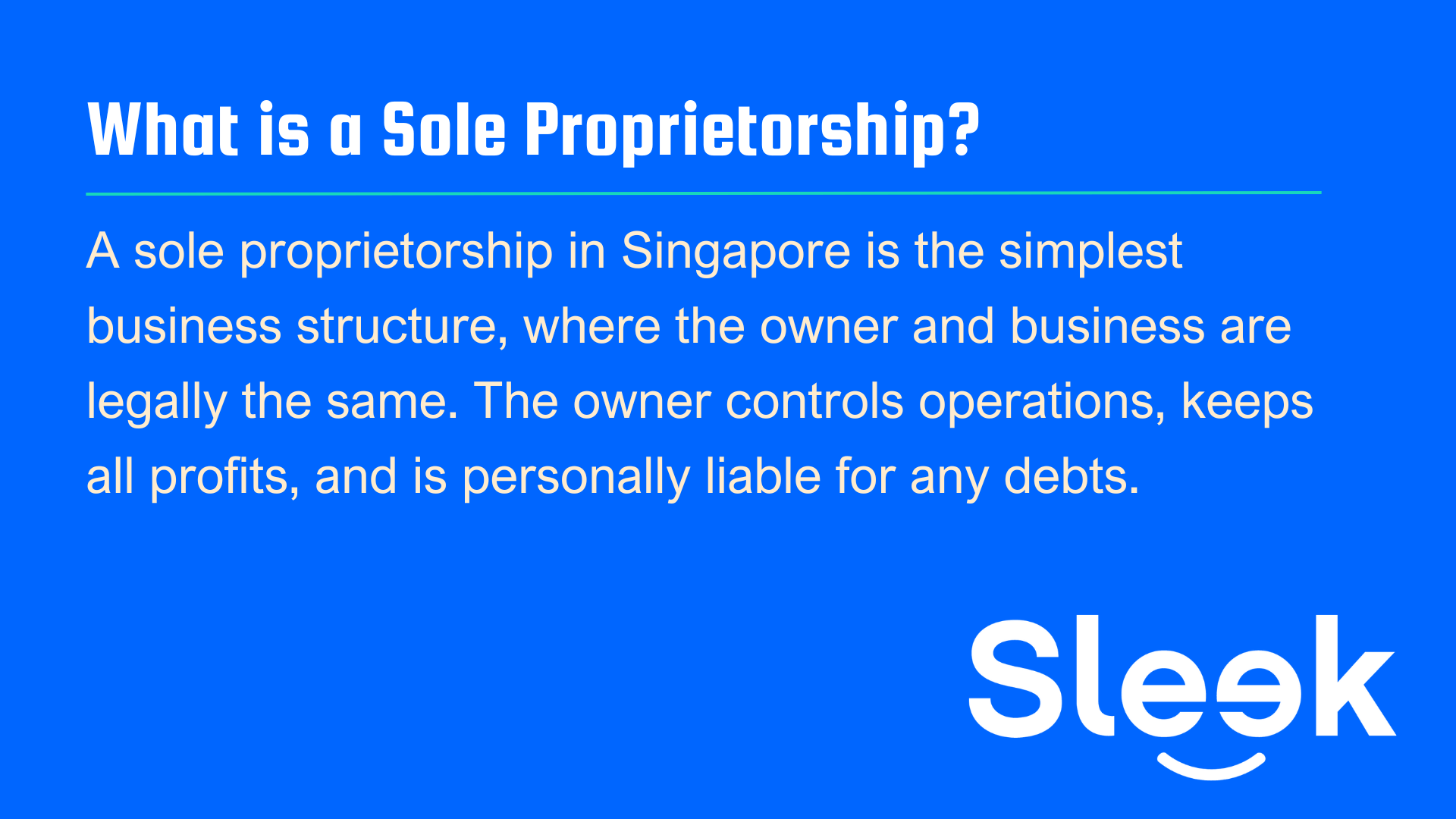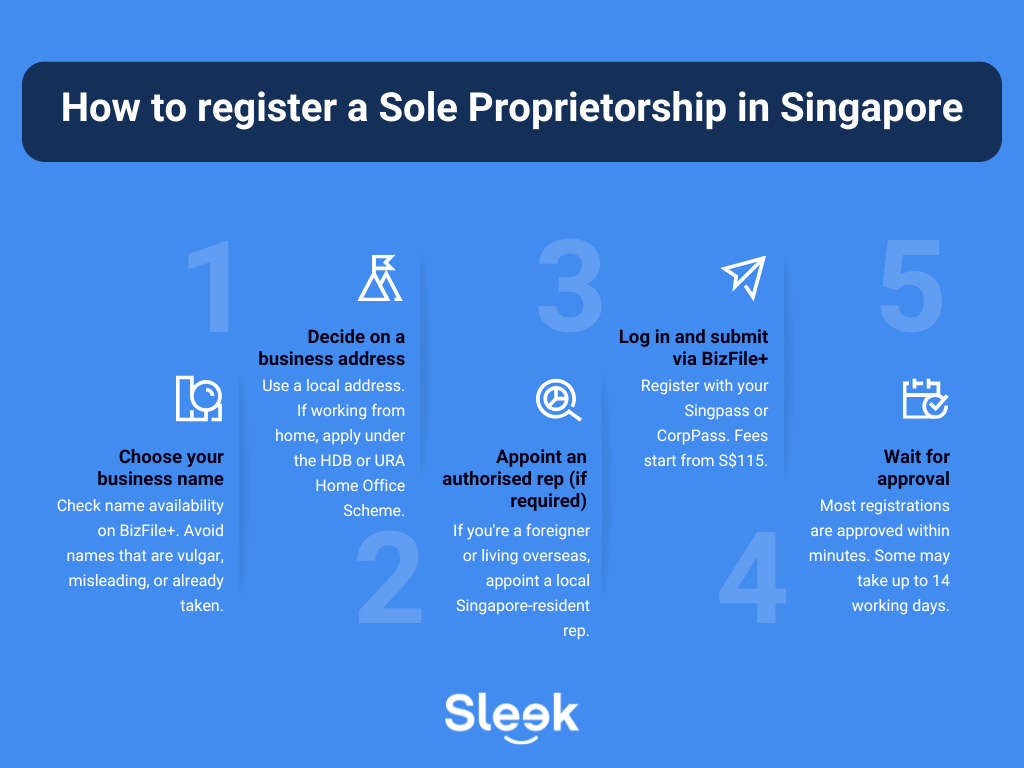Sole proprietorship in Singapore is perfect if you want to test an idea, take your freelance work seriously, or start lean. But even a simple setup deserves a second look, especially when your name is legally tied to every decision.
This guide will help you make sense of the process, the paperwork, and the practical choices that come with being your own boss.
What is a sole proprietorship?

A sole proprietorship in Singapore is the most straightforward business structure, where the business and the owner are legally the same entity. As the sole proprietor, you have complete control over operations and retain all profits, but you’re also personally liable for any debts or legal obligations.
This structure is ideal for freelancers, consultants, and small business owners who want a low-cost, low-compliance way to operate under a registered business name.
Who can register a sole proprietorship in Singapore?
You can register a sole proprietorship in Singapore if you are:
- A Singapore Citizen, Permanent Resident, or EntrePass/ONE Pass/Tech.Pass holder
- At least 18 years old
- Not an undischarged bankrupt (unless you have court or official approval)
Before applying, make sure you have a local business address and a clear idea of your business activity (SSIC code).
Foreigners can set up a sole proprietorship but need a local authorised representative. Planning to run it from abroad? You’ll need MOM’s green light. Full details coming up.
Pros of registering a sole proprietorship in Singapore
Running lean, fast, and on your own terms? A sole proprietorship in Singapore lets you do just that. Here’s why it’s a go-to for solo founders and side hustlers.
- Full control, no red tape
You run the business your way. No shareholders, no board meetings. If you’re a freelance designer or selling bakes from home, you can make decisions fast and pivot quickly. - Affordable and fast to register
Registering with ACRA costs as little as S$115 and can be done online in under an hour. No paid-up capital required. Perfect for side hustlers or new service providers testing the waters. - Low compliance, fewer admin headaches
You don’t need to appoint a corporate secretary or file annual returns. Just keep track of your income and expenses and file your personal tax return with IRAS. - Personal income tax applies
Your profits are taxed at personal income tax rates, which are progressive in Singapore. For example, if your chargeable income is under S$40,000, your tax payable could be very low or even zero, especially after applying common personal reliefs such as the Earned Income Relief, CPF relief, or NSman relief if you are eligible.
- Easy to shut down
If things don’t work out, closing your business is as easy as logging into BizFile+ and filing a cessation. No legal fees or complex exit procedures.
Cons of registering a sole proprietorship
For all its benefits, a sole proprietorship has real downsides too. From liability to limited growth, here’s what you need to watch out for.
- You’re personally liable for everything
There’s no legal buffer between you and your business. If a customer sues you or you default on a supplier payment, your personal savings or HDB flat could be at risk. - Less trust with clients and lenders
Government grants and corporate clients often prefer to work with registered companies (Pte Ltds). For example, some Startup SG grants require you to be incorporated. - Limited growth and funding options
You can’t bring on investors or issue shares. If you’re planning to build a scalable tech startup or expand regionally, this structure can hold you back. - No access to corporate tax perks
Sole proprietors don’t qualify for the Start-up Tax Exemption (SUTE) or partial tax exemption schemes meant for companies. Over time, this could mean paying more tax than a Pte Ltd would. - Harder to separate personal and business finances
While you can open a business bank account, there’s no legal distinction between your money and the business’s. This can get messy during tax season or when applying for a home loan.
Documents required to set up a sole proprietorship in Singapore
Before registering your sole proprietorship in Singapore, prepare the following:
- Proposed business name (check on BizFile+)
- Description of business activity (SSIC code)
- Local Singapore address (home or office)
- NRIC or FIN copy
- Proof of residential address
- Declaration of Compliance and Non-Disqualification

If you're self-employed, ensure your Medisave contributions are up to date with CPF before applying.
How to register a sole proprietorship in Singapore

Setting up a sole proprietorship in Singapore is a simple process, but knowing the exact steps ahead of time can save you time and headaches. Here’s what to expect:
- Choose your business name Your business name must be unique and cannot be vulgar or misleading. You can use ACRA’s BizFile+ portal to check name availability.
- Decide on a business address You’ll need a Singapore address (residential or commercial) to register. If you’re using your home address, apply under the HDB or URA Home Office Scheme.
- Appoint an authorised representative (if required) Foreigners or those not living in Singapore must appoint a local representative who is at least 18 years old and legally resident in Singapore.
- Log in to BizFile+ and submit your application Use your Singpass or CorpPass to register through BizFile+. You’ll need to provide your personal details, SSIC code, and address. The fee is S$115 for 1 year or S$175 for 3 years.
- Wait for approval Most applications are processed within 15 minutes, but those requiring name review or additional licenses can take up to 14 working days.
Check if you need additional licences
Depending on your business activity, you may need licences or approvals from other government agencies (e.g., F&B, education, healthcare). Use the GoBusiness Licensing Portal to find out what approvals you may need before starting operations.
Sole proprietorship in Singapore for foreigners: What to consider
If you’re a foreigner based overseas and want to set up a sole proprietorship in Singapore, there are a few extra steps you must follow:
- Appoint a local authorised representative who is at least 18 years old and legally residing in Singapore (must be a Singapore Citizen, PR, or a holder of an EntrePass or Employment Pass).
- You cannot submit the BizFile+ application yourself unless you have a SingPass account. Instead, you must engage a registered filing agent, such as Sleek, a law firm, or an accounting or corporate secretarial firm, to submit the application on your behalf.
- If you plan to relocate and personally manage your business in Singapore, you’ll need to obtain approval from the Ministry of Manpower (MOM) and hold a valid work pass (e.g., EntrePass, ONE Pass, Tech.Pass, or a Dependant’s Pass with a Letter of Consent).

Many foreign entrepreneurs find it more flexible to register a Private Limited Company, which opens more visa options and access to grants.
How much does it cost to register a sole proprietorship?
Sole proprietorships are one of the most affordable business structures to set up in Singapore.
Here’s how much it costs to register with ACRA:
- Name application fee: S$15
- Registration fee: S$100 for 1 year or S$160 for 3 years
Total: S$115 for 1 year or S$175 for 3 years
Note: You must complete the name application before registering your business.
There’s no requirement for paid-up capital, and no recurring compliance filings like annual returns.
If you’d prefer support with the process, like navigating SSIC codes, business name checks, or understanding next steps, Sleek offers registration assistance with everything handled for you.
How to close a sole proprietorship in Singapore
Decided to wrap up your business? Shutting down a sole proprietorship in Singapore is simple and can be done online.
Steps to close your sole proprietorship:
- Log in to BizFile+ using your Singpass or Corppass.
- Submit a “Cessation of Business” transaction.
- Your business will cease immediately after submission.
Remember to:
- Cancel any permits or licenses
- Notify clients and suppliers
- Close your business bank account
There are no penalties for closing as long as your taxes and obligations are settled.
How Sleek helps with sole proprietorships
Setting up a sole proprietorship in Singapore is simple, but making the right decisions early on can save you time, stress, and money later.
At Sleek, we help you go beyond just sole proprietorship registration. From choosing the right business activity code to ensuring compliance and advising when it’s time to convert to a Private Limited Company, we’re here to support your journey as your business grows.
Wherever you are in the process, Sleek can help make things a little simpler.
Start solo, but not alone.
FAQs on sole proprietorship in Singapore
Do I need paid-up capital to start a sole proprietorship?
No, there is no minimum paid-up capital required to start a sole proprietorship in Singapore. This makes it a highly accessible business structure, especially for freelancers, consultants, and small service providers looking to start lean without committing upfront financial resources.
Can I hire employees as a sole proprietor?
Yes, sole proprietors in Singapore can hire both local and foreign employees. To do so, you’ll need to register for CPF contributions, obtain Work Injury Compensation Insurance (WICA), and meet Ministry of Manpower (MOM) requirements, including quotas and levies for hiring foreign workers.
Can I use my personal bank account for my sole proprietorship?
While legally allowed, using a personal bank account for business is not recommended. A separate business account helps you maintain cleaner financial records, avoid tax reporting issues, and improve credibility when applying for loans, grants, or working with corporate clients.
Do I need to file annual returns with ACRA?
No, annual return filing is not required for sole proprietorships in Singapore. However, you are still responsible for maintaining accurate financial records and declaring your business income in your personal income tax return with IRAS each year, usually via Form B or B1.
Can I convert my sole proprietorship to a private limited company?
Yes, you can convert a sole proprietorship to a Pte Ltd in Singapore. This involves incorporating a new company with ACRA, transferring assets and contracts, and formally closing your sole proprietorship within three months to complete the transition.
Can I apply for government grants as a sole proprietor?
Sole proprietors may have access to some schemes, but many key government grants, such as Startup SG, Enterprise Development Grant (EDG), and PSG, require a Private Limited Company. Grant eligibility often includes requirements like local shareholding and incorporation under the Companies Act.
References:
450,000
businesses worldwide.
from 4,100+ reviews.
satisfaction rate from
16,000 surveyed clients.





